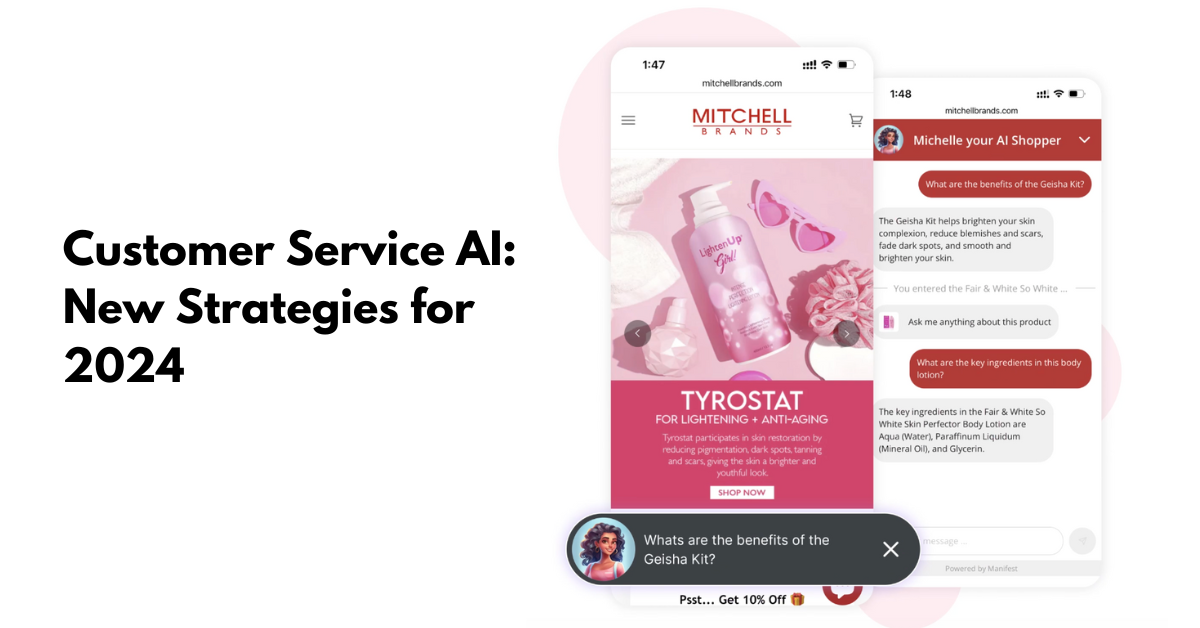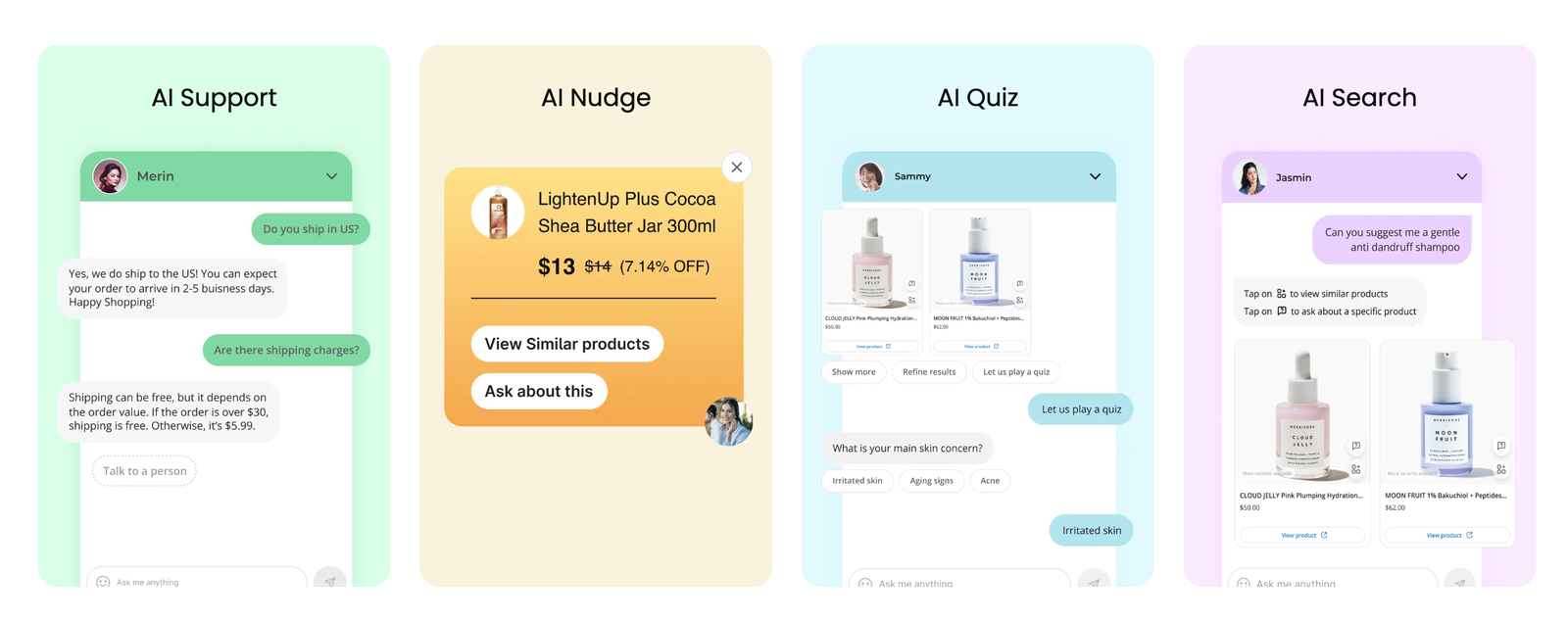Customer Service AI: New Strategies for 2024

Artificial intelligence continues to revolutionize customer service. AI tools are now more sophisticated, offering solutions that not only streamline operations but also significantly improve response times and accuracy. Recent studies suggest that businesses adopting AI in customer service report a 40% reduction in response times and a 38% increase in customer satisfaction.
This blog explores new AI strategies that are setting the standard for customer interactions, providing a glimpse into the future of efficient and effective customer service solutions.
What is AI in Customer Service?

AI in customer service refers to the use of artificial intelligence technologies to automate and enhance support services provided to customers. This includes the use of chatbots that can handle routine inquiries and issues 24/7, reducing wait times and freeing up human agents for more complex tasks. AI also helps in analyzing vast amounts of data to identify patterns and predict customer behavior, enabling proactive service.
Furthermore, AI can personalize customer interactions by learning from past interactions to deliver personalized product recommendations and support. Overall, AI improves the efficiency, effectiveness, and personalization of customer service, leading to higher customer satisfaction and loyalty.
Benefits of AI in Customer Service

The integration of AI into customer service offers several significant benefits that align with current trends in technology and customer expectations:
- Increased Efficiency: AI automates routine tasks such as answering frequently asked questions or processing simple requests. This speeds up response times and allows customer service teams to handle higher volumes of queries without additional resources.
- 24/7 Availability: AI chatbot for customer service can provide round-the-clock assistance to customers. This is crucial in a global market where customers expect help at any hour without delay.
- Improved Accuracy: AI systems can access and process vast databases of information to provide accurate responses to customer inquiries. They learn from interactions to continuously improve their accuracy and relevance in responses.
- Personalized Interactions: AI analyzes customer data and past interactions to tailor conversations and solutions specifically to individual needs. This personalization can significantly enhance the customer experience and satisfaction.
- Predictive Assistance: AI can predict customer issues before they escalate by analyzing behavior patterns and usage data. This proactive approach can solve problems before customers feel the need to reach out, effectively reducing the number of incoming queries.
- Cost Reduction: By automating many aspects of customer service, AI can reduce the need for a large staff, thereby cutting down on operational costs. This makes customer service more scalable and economically efficient.
- Enhanced Data Analysis: AI tools can analyze feedback and communication patterns to provide insights into customer preferences and behavior, helping companies refine their products and services.
Customer Service AI Examples
AI has been increasingly integrated into customer service environments to enhance efficiency and customer satisfaction. Here are some current and prevalent examples:
- Chatbots and Virtual Assistants: Many companies use AI-driven chatbots to handle first-level customer queries. These bots can answer FAQs, track orders, and even assist with basic troubleshooting. They are available around the clock, which ensures immediate response times, reducing customer wait periods.
- Predictive Analytics: AI analyzes customer data to predict future behaviors and preferences. This can inform personalized marketing strategies, anticipate service issues before they escalate, and tailor the customer service experience to individual needs.
- Voice Recognition: AI-powered voice recognition systems are used in call centers to route calls to the appropriate department. They can understand and process customer requests without human intervention, speeding up the resolution process.
- Automated Ticketing Systems: These systems use AI to manage incoming customer service requests. AI sorts prioritizes, and routes tickets to the correct department or team member, optimizing workflow and response time.
- Emotion Recognition: Advanced AI technologies can analyze voice tones and speech patterns to recognize customer emotions. This capability allows service agents to adjust their strategies and responses based on the emotional state of the customer, aiming to improve the interaction quality.
- Machine Learning for Continuous Improvement: AI systems learn from each interaction to improve accuracy and efficiency. They update their responses and strategies based on new information and outcomes, continually enhancing their effectiveness in customer service.
How to Use Generative AI to Improve Customer Service?
Using generative AI to improve customer service involves several strategic steps that can enhance the efficiency and quality of customer interactions. Here’s how to implement generative AI in a customer service environment:
- Identify Use Cases
Determine which aspects of your customer service can benefit most from AI integration. Common applications include handling common inquiries, providing product recommendations, and resolving standard issues.
- Choose the Right AI Technology
Select a generative AI platform that suits your specific needs. Consider factors like language capabilities, learning abilities, and ease of integration with existing systems.
- Train the AI Model
Input historical customer service data into the AI chatbot to train on your data. This includes chat logs, call transcripts, and email exchanges. The AI uses this data to learn how to respond in ways that are consistent with your business’s service standards.
- Set Parameters for AI Interaction
Define the scope of issues that the AI is authorized to handle. Ensure that it escalates more complex or sensitive issues to human agents.
- Integrate with Existing Systems
Seamlessly integrate the AI into your current customer service platforms, such as CRM systems, chat interfaces, and email management tools. This integration allows the AI to access all necessary information to provide coherent and contextually appropriate responses.
- Monitor and Optimize
Continuously monitor the AI’s performance to ensure it meets customer satisfaction standards. Use customer feedback and AI-generated insights to refine and improve interactions. Adjust AI responses based on what is working well and what isn’t.
- Ensure Compliance and Security
Implement robust security measures to protect customer data and ensure that the AI operates within all relevant legal and ethical guidelines.
- Train Your Team
Educate your customer service staff on how to work alongside AI tools. Training should include understanding the AI’s capabilities, knowing when to take over from the AI, and how to use insights generated by the AI to provide better service.
- Continuously Update the AI
As your products, services, and customer expectations evolve, regularly update the AI model with new data and scenarios. This keeps the AI’s responses relevant and effective.
3 Best Customer Service AI Tools
Here's a detailed overview of three top AI tools that enhance customer service, starting with Manifest AI:
Manifest AI

Manifest AI is a GPT -4-powered AI shopping assistant designed specifically for Shopify stores. It helps automate interactions by handling inquiries, guiding customers through purchasing decisions, and providing support.
Features: This tool features AI-driven search capabilities, interactive AI quizzes, and personalized AI nudges that encourage customer engagement. It also includes advanced support functionalities that reduce the need for human intervention by up to 80%.
Benefits: Manifest AI improves average order values, boosts engagement rates, and enhances overall conversion rates, making it a valuable asset for e-commerce businesses looking to streamline operations and elevate customer experiences.
Zendesk Answer Bot

Zendesk Answer Bot is integrated within the Zendesk customer service platform. It uses machine learning to help answer customer queries promptly and accurately.
Features: The bot can understand and respond to customer questions based on a knowledge base that evolves over time. It routes complex queries to human agents when necessary. It also supports multiple languages, making it ideal for global businesses.
Benefits: The Answer Bot reduces response times and lightens the load on customer service teams, allowing businesses to scale their customer service efforts without proportionally increasing their support staff.
IBM Watson Assistant

IBM Watson Assistant is designed to build conversational AI for customer service into any application, device, or channel.
Features: It includes voice recognition and text-to-speech capabilities, can be integrated across multiple platforms, and offers industry-specific solutions. Watson Assistant excels in understanding nuances in language and context, providing more accurate responses.
Benefits: It provides a seamless customer experience by accurately handling inquiries and automating responses. It also personalizes interactions based on user history and preferences, thereby improving customer satisfaction and retention rates.
Future of AI in Customer Service
The future of AI for customer service is set to transform how businesses interact with their customers through several key developments:
- Enhanced Personalization: AI will enable even deeper personalization of customer interactions by analyzing data from past behavior to predict future needs and preferences. This means AI can offer tailored advice, anticipate issues before they become problems, and engage customers in a more meaningful way.
- Improved Efficiency and Automation: Future AI systems will handle a broader range of customer service tasks, from initial inquiries to complex problem-solving. This will reduce the need for human intervention in routine transactions and free up human agents to manage more complex or sensitive issues.
- Seamless Omnichannel Support: AI will provide consistent and seamless support across multiple channels (like messaging apps, social media, and live chat). Customers will receive the same level of service whether they are on a phone call, a web chat, or interacting through a voice assistant.
- Advanced Predictive Capabilities: With advancements in machine learning, AI will not only respond to customer needs but also anticipate them, using predictive analytics to offer proactive solutions and prevent dissatisfaction.
- Emotion Detection and Interaction: AI technologies will evolve to better understand and respond to human emotions. By analyzing voice tones and textual nuances, AI will adjust its responses to suit the emotional state of the customer, enhancing communication and building trust.
- Integration with IoT: As more devices become connected, AI in customer service will integrate with the Internet of Things (IoT) to offer support that is contextual to device usage and issues, providing solutions tailored to real-time device data.
- Ethical and Privacy Considerations: With the increased use of AI, there will be a stronger focus on ethical standards and privacy protection. AI will need to be transparent in how it uses customer data, ensuring privacy and trust are maintained.
Conclusion
The adoption of AI in customer service is set to continue its significant growth in 2024. The implementation of new strategies using AI technologies promises to enhance the efficiency of customer interactions, improve the accuracy of responses, and provide a more personalized experience for users. As businesses increasingly rely on these sophisticated tools, they will see marked improvements in customer satisfaction and operational efficiency. Embracing these AI-driven innovations will be crucial for companies aiming to stay competitive and responsive in the rapidly evolving service landscape.
FAQs
Here are the most frequently asked questions related to customer service AI:
Will AI replace customer service?
AI is unlikely to fully replace customer service but will enhance it by automating routine tasks and improving efficiency. Human interaction will remain essential for handling complex and sensitive issues where empathy and nuanced understanding are required

.png)
